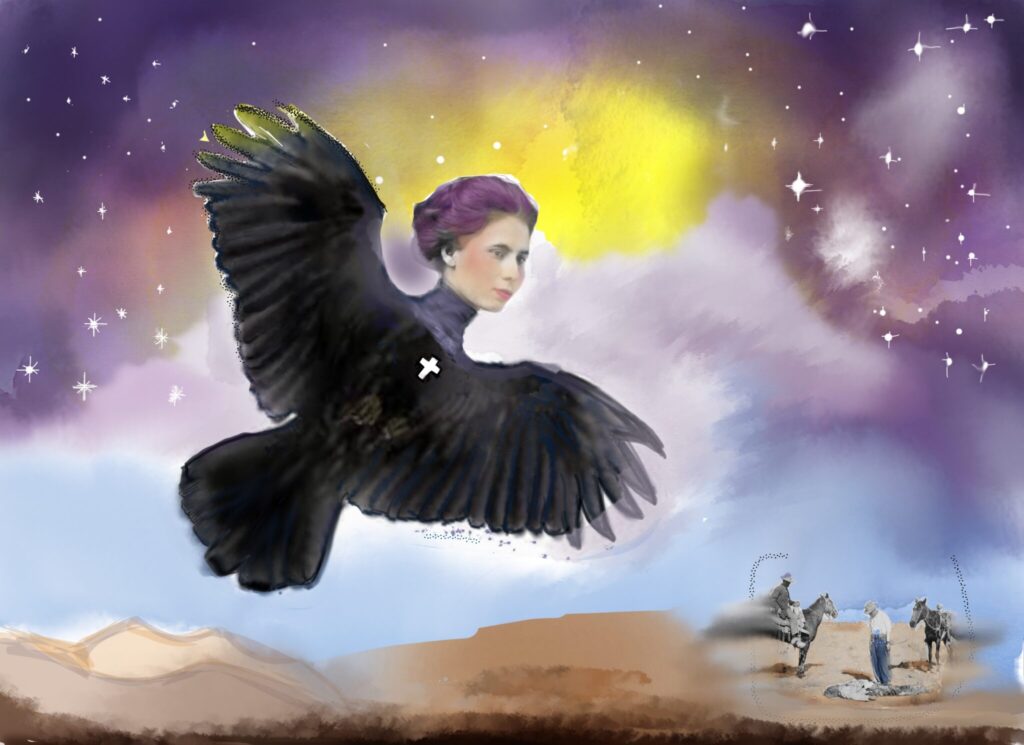"When you educate a woman you will educate a family."

When writing about the injustices plaguing Mexican-Americans in Laredo, Texas, during the first decades of the 20th century, journalist Jovita Idar often signed her columns with the pseudonym Astrea, for the Greek goddess of justice, or Ave Negra, Spanish for blackbird.

As racial violence erupted along the United States-Mexico borderlands, particularly in south Texas from 1910 to 1919, Jovita Idar worked tirelessly alongside her brothers and father at the family’s progressive newspaper La Cronica, documenting discrimination, segregation, and poverty.
In Greek mythology Astrea became so disgusted by how far the human race had descended into misery and wickedness, defiling the innocence of a former paradise, she fled earth, never to return.
Jovita witnessed rampant lawlessness that included the lynchings of ethnic Mexican men. Perhaps during those horrific times the activist wished she could flap her own wings and rise above such earth-bound violence and hate.
Jovita was the second of eight children born to Jovita and Nicosia Idár. Her father worked as editor and publisher of a local Spanish newspaper, La Crónica, which reported extensively on the borderlands and on the Mexican Revolution.
In 1911, as the Revolution of 1910 - 1920 raged, and Mexican refugees entered the US to escape the war, the Idar family organized the First Mexican Congress, or El Primer Congreso Mexicanista, to unite the community on both sides of the border around social, economic, and educational issues.
The convention was attended by hundreds of Mexican representatives, journalists, community activists, and citizens from Mexico and across Texas, forming the largest Mexican-American civil rights forum during that period.
At the Congress, Jovita was elected president of the Liga Femenil Mexicanista, a feminist organization that championed women and their voices. She used the platform to urge women to get educated and vote, to seek their own independence from men. To “proudly raise your chins and face the fight.”
This was dangerous work for a twenty-five-year-old woman but Jovita was determined and tireless. Like many women throughout history, she had no time to worry if her voice was too much, too loud, too wrong or offending. The blackbird sang her persistent song: “Proudly raise your chins and face the fight.”
After Jovita wrote a scathing column in the newspaper El Progreso critical of American president Woodrow Wilson and U.S. foreign policy in Mexico, a gang of Texas Rangers descended on the building. Citing her rights under the First Amendment, Jovita stood her ground, blocking their entry into the newsroom. That the Rangers returned the next day and destroyed the newspaper’s printing presses is beside the point.
Jovita was a Mexicanista in perpetual motion. She later crossed the border to join the Constitutionalist forces of the Mexican Revolution as a nurse. After she married and moved to San Antonio, she opened a free kindergarten. She never had children of her own, but helped raise her sister’s after she died in childbirth. Jovita also worked at a hospital as an interpreter for Spanish-speaking patients and taught infant care courses, all while editing El Heraldo Christiano, a Methodist Church newspaper. Only sixty when she died in 1946, Jovita had clearly lived several lifetimes.
For decades Jovita was mostly forgotten. Only in recent years has she gained recognition as a pivotal figure in Texas and transborder history. Jovita is now the subject of a PBS American Masters documentary. The New York Times published her obituary in its “Overlooked” series, 74 years after her death. The Laredo City Council renamed a park in her name. And in 2023 the United States Mint will release a special-issue coin in the American Women Quarters series, along with Eleanor Roosevelt and Maya Angelou.
In the black-and-white portrait of Jovita, taken when she was about twenty years old, she appears in a prim high-collared dark blouse, her brown hair gathered atop her head, her gaze away from the viewer. One might wonder from where she drew her strength in a world that barely tolerated her. Sometimes even despised her.
Today we hold Jovita Idar in high esteem as the original Mexicanista, our guiding star within this project that takes as its central mission to champion women and their voices. To celebrate Mexicanistas and their achievements both big and small.
With her courage and conviction, her empathy and creativity, her ability to step up and act, she embodies Mexicanista values.